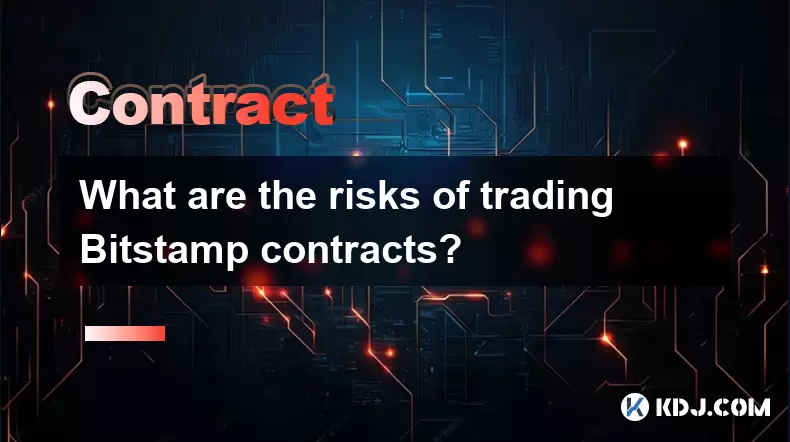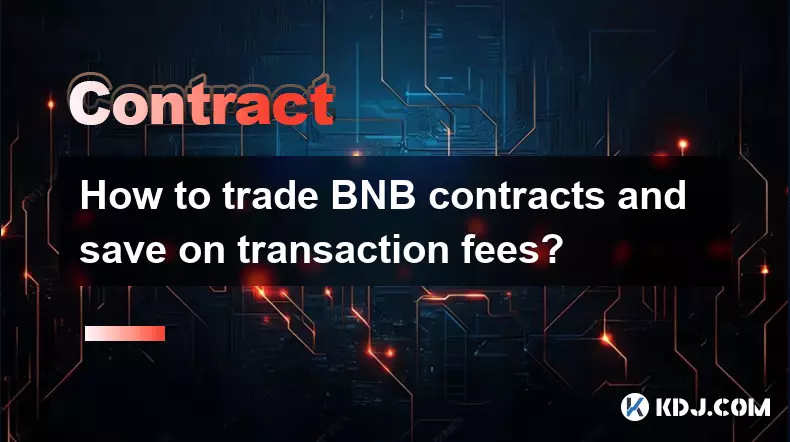-
 bitcoin
bitcoin $87959.907984 USD
1.34% -
 ethereum
ethereum $2920.497338 USD
3.04% -
 tether
tether $0.999775 USD
0.00% -
 xrp
xrp $2.237324 USD
8.12% -
 bnb
bnb $860.243768 USD
0.90% -
 solana
solana $138.089498 USD
5.43% -
 usd-coin
usd-coin $0.999807 USD
0.01% -
 tron
tron $0.272801 USD
-1.53% -
 dogecoin
dogecoin $0.150904 USD
2.96% -
 cardano
cardano $0.421635 USD
1.97% -
 hyperliquid
hyperliquid $32.152445 USD
2.23% -
 bitcoin-cash
bitcoin-cash $533.301069 USD
-1.94% -
 chainlink
chainlink $12.953417 USD
2.68% -
 unus-sed-leo
unus-sed-leo $9.535951 USD
0.73% -
 zcash
zcash $521.483386 USD
-2.87%
What are the risks of trading Bitstamp contracts?
Bitstamp doesn't offer futures or leverage; contract trading using its data happens on third-party platforms, exposing users to leverage, counterparty, and liquidity risks.
Jul 31, 2025 at 07:43 am

Understanding Bitstamp Contracts
Bitstamp offers spot trading primarily, but users sometimes confuse it with derivative products like futures or perpetual contracts available on other exchanges. Bitstamp does not currently offer native futures contracts, so any 'contract trading' involving Bitstamp typically refers to third-party platforms using Bitstamp as a liquidity source or users manually replicating contract strategies using spot pairs. This distinction is crucial because the risks differ significantly from centralized exchanges that offer leveraged derivatives. Always verify whether the platform you're using is Bitstamp directly or a third-party service claiming Bitstamp integration.
Leverage Amplifies Losses
If you're trading contracts that use Bitstamp data or assets, leverage is one of the most immediate risks. Leverage allows traders to control larger positions with smaller capital, but it also magnifies losses. For example:
- A 5x leveraged position means a 20% adverse move in price can liquidate your entire investment.
- A 10x leveraged position means a 10% move against you results in total loss.
- Liquidation engines on contract platforms often trigger automatically without warning.This risk exists even if Bitstamp itself doesn't offer leverage — if you're using another platform that uses Bitstamp prices, you're still exposed to the same volatility and margin mechanics.
Counterparty and Platform Risk
When trading contracts that reference Bitstamp’s prices or hold Bitstamp-based assets, you’re exposed to counterparty risk. This means: - The contract provider (not Bitstamp) may fail to honor payouts.
- If the platform goes offline or experiences a hack, your funds may be unrecoverable.
- Some platforms use Bitstamp’s API for price feeds; if that feed is delayed or manipulated, your contract may settle unfairly.Always check whether the contract provider is regulated, audited, and transparent about how they use Bitstamp data. Never assume Bitstamp’s reputation extends to unrelated third-party platforms.
Slippage and Liquidity Gaps
Bitstamp’s spot markets are generally liquid for major pairs like BTC/USD or ETH/EUR, but slippage becomes a major issue when: - You're executing large orders that exceed available order book depth.
- Market volatility spikes (e.g., during news events), causing prices to jump rapidly.
- Third-party contract platforms rely on Bitstamp’s price but don’t have matching liquidity to fulfill your contract position.For example, if you open a contract based on Bitstamp’s BTC price at $60,000, but a sudden sell-off drops the price to $58,000 before your order fills, you may enter at a worse rate than expected — or not at all.
Operational Risks: How to Avoid Common Mistakes
To reduce exposure when trading contracts tied to Bitstamp: - Verify the contract terms: Read the fine print on leverage, funding rates, and liquidation thresholds.
- Use test environments: Many platforms offer demo modes — practice there before risking real funds.
- Set stop-losses manually: Don’t rely solely on automated systems; monitor positions actively.
- Check API status: Bitstamp’s API can go down — if your contract platform uses it for pricing, this could cause mispricing or failed executions.
- Enable 2FA on Bitstamp: Even if you're not trading directly on Bitstamp, securing your account prevents unauthorized access to assets used as collateral elsewhere.
Regulatory and Tax Exposure
Trading contracts based on Bitstamp data may trigger unexpected regulatory obligations. For example: - Some jurisdictions classify leveraged crypto contracts as gambling or unlicensed derivatives.
- Profits from contract trading may be taxed differently than spot trades — often at higher rates.
- Bitstamp itself may not report your contract activity to tax authorities, leaving you responsible for self-reporting.Always consult a tax professional in your country to understand how contract trading — even if indirectly linked to Bitstamp — affects your compliance status.
Frequently Asked Questions
Does Bitstamp offer futures or options contracts?No, Bitstamp currently only supports spot trading. Any contract trading must occur on third-party platforms that may use Bitstamp’s price feed or allow deposits from Bitstamp wallets.
Can I lose more than my initial deposit trading Bitstamp-linked contracts?Yes, if the contract platform allows cross-margin or negative balance protection is absent, you can owe money beyond your initial deposit — especially with high leverage.
How do I know if a contract platform is using Bitstamp’s real-time data?Check the platform’s documentation for “price oracle” or “feed source.” Look for terms like “Bitstamp API v2” or “real-time BTC/USD from Bitstamp.” You can cross-verify by comparing prices manually on both platforms simultaneously.
What happens if Bitstamp’s API goes down while I’m in a contract position?The contract platform may use stale data or switch to another exchange’s feed, potentially triggering unfair liquidations or incorrect profit/loss calculations. Always monitor API status pages and avoid holding open positions during scheduled maintenance.
Disclaimer:info@kdj.com
The information provided is not trading advice. kdj.com does not assume any responsibility for any investments made based on the information provided in this article. Cryptocurrencies are highly volatile and it is highly recommended that you invest with caution after thorough research!
If you believe that the content used on this website infringes your copyright, please contact us immediately (info@kdj.com) and we will delete it promptly.
- Big Apple Bit: Bitcoin's Rebound Hides a Deeper Dive, Say Wave 3 Watchers
- 2026-02-04 07:00:03
- DeFi Vaults Poised for 2026 Boom: Infrastructure Matures, Yield Optimization and Liquidity Preferences Shape the Future
- 2026-02-04 06:50:01
- Royal Canadian Mint Unveils 'Gold Dime' with Astounding High Value, Captivating Collectors
- 2026-02-04 06:55:01
- Datavault AI Dives into Digital Collectibles with Dream Bowl Meme Coin II, Navigating the Wild West of Web3
- 2026-02-04 06:30:02
- New VistaShares ETF Merges Bitcoin and Treasuries for Enhanced Income
- 2026-02-04 06:55:01
- Epstein's Bitcoin Bet: Newly Uncovered Statements Detail Dark Figure's Early Crypto Foray
- 2026-02-04 06:40:02
Related knowledge

How to close a crypto contract position manually or automatically?
Feb 01,2026 at 11:19pm
Manual Position Closure Process1. Log into the trading platform where the contract is active and navigate to the 'Positions' or 'Open Orders' tab. 2. ...

How to understand the impact of Bitcoin ETFs on crypto contracts?
Feb 01,2026 at 04:19pm
Bitcoin ETFs and Market Liquidity1. Bitcoin ETFs introduce institutional capital directly into the spot market, increasing order book depth and reduci...

How to trade DeFi contracts during the current liquidity surge?
Feb 01,2026 at 07:00am
Understanding Liquidity Dynamics in DeFi Protocols1. Liquidity surges in DeFi are often triggered by coordinated capital inflows from yield farming in...

How to use social trading to copy crypto contract experts?
Feb 02,2026 at 07:40am
Understanding Social Trading Platforms1. Social trading platforms integrate real-time market data with user interaction features, enabling traders to ...

How to trade BNB contracts and save on transaction fees?
Feb 03,2026 at 12:39am
Understanding BNB Contract Trading Mechanics1. BNB contracts are derivative instruments traded on Binance Futures, allowing users to gain leveraged ex...

How to build a consistent crypto contract trading plan for 2026?
Feb 02,2026 at 10:59pm
Defining Contract Specifications1. Selecting the underlying asset requires evaluating liquidity depth, historical volatility, and exchange support acr...

How to close a crypto contract position manually or automatically?
Feb 01,2026 at 11:19pm
Manual Position Closure Process1. Log into the trading platform where the contract is active and navigate to the 'Positions' or 'Open Orders' tab. 2. ...

How to understand the impact of Bitcoin ETFs on crypto contracts?
Feb 01,2026 at 04:19pm
Bitcoin ETFs and Market Liquidity1. Bitcoin ETFs introduce institutional capital directly into the spot market, increasing order book depth and reduci...

How to trade DeFi contracts during the current liquidity surge?
Feb 01,2026 at 07:00am
Understanding Liquidity Dynamics in DeFi Protocols1. Liquidity surges in DeFi are often triggered by coordinated capital inflows from yield farming in...

How to use social trading to copy crypto contract experts?
Feb 02,2026 at 07:40am
Understanding Social Trading Platforms1. Social trading platforms integrate real-time market data with user interaction features, enabling traders to ...

How to trade BNB contracts and save on transaction fees?
Feb 03,2026 at 12:39am
Understanding BNB Contract Trading Mechanics1. BNB contracts are derivative instruments traded on Binance Futures, allowing users to gain leveraged ex...

How to build a consistent crypto contract trading plan for 2026?
Feb 02,2026 at 10:59pm
Defining Contract Specifications1. Selecting the underlying asset requires evaluating liquidity depth, historical volatility, and exchange support acr...
See all articles





















![[FULL STORY] My grandfather left me his [FULL STORY] My grandfather left me his](/uploads/2026/02/03/cryptocurrencies-news/videos/origin_6981f669e270a_image_500_375.webp)




















































